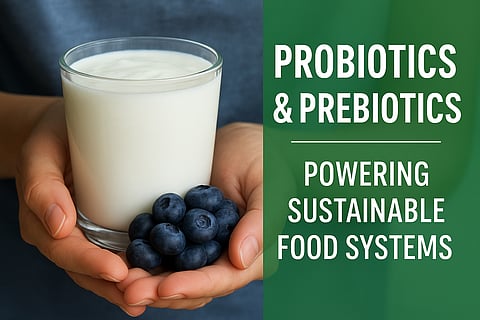Insight: Probiotics and Prebiotics - Powering Sustainable Food Systems
As the global population edges toward 10 billion, the demand for nutritious, safe, and sustainable food is higher than ever. One emerging pathway to meeting this challenge lies in probiotics and prebiotics—bioactive components that not only promote human and animal health but also offer innovative solutions for a more sustainable food system.
Understanding Probiotics and Prebiotics
Probiotics are live microorganisms—primarily beneficial bacteria—that, when consumed in adequate amounts, confer health benefits to the host. Common examples include Lactobacillus and Bifidobacterium strains found in fermented foods like yogurt, kefir, and kimchi.
Prebiotics are non-digestible food components, typically fibers, that nourish and stimulate the growth of beneficial gut microbes. Sources include inulin, fructooligosaccharides, and resistant starch found in foods such as garlic, onions, bananas, and whole grains.
Together, they help maintain a healthy gut microbiome, which plays a key role in immunity, digestion, mental health, and even metabolic efficiency.
Impact on Food Sustainability
Reducing Food Waste
Probiotics are widely used in fermentation processes that preserve foods naturally, reducing reliance on chemical preservatives and extending shelf life. Fermented products can turn perishable ingredients into long-lasting, nutrient-rich foods, cutting down on food loss across the supply chain.Sustainable Livestock Production
In animal agriculture, probiotics and prebiotics improve gut health, feed efficiency, and disease resistance. Healthier livestock require fewer antibiotics and produce less waste, lowering greenhouse gas emissions and reducing the environmental footprint of meat and dairy production.Enhancing Plant-Based Foods
Emerging research highlights soil probiotics, such as beneficial bacteria and fungi, that improve nutrient uptake and plant resilience. These microbes can reduce dependency on synthetic fertilizers and pesticides, promoting regenerative agriculture and healthier crop yields with minimal environmental impact.Supporting Circular Food Systems
Fermentation and microbiome-based technologies can transform agricultural by-products and food waste into high-value ingredients, such as protein powders, functional fibers, or bioactive compounds. This creates closed-loop systems, where waste becomes a resource, aligning with the principles of a circular economy.
A Future with Functional Food Systems
The integration of probiotics and prebiotics into food systems represents more than a health trend—it is a strategic lever for sustainability. By supporting human and animal health, reducing waste, and optimizing agricultural practices, microbiome-focused solutions are helping build resilient, low-impact food systems.
As innovation in this field grows, partnerships between food scientists, farmers, and policymakers will be critical to scale these technologies. With informed adoption, probiotics and prebiotics could become central to meeting global nutrition needs while preserving the planet’s resources.
Conclusion: From gut health to environmental impact, probiotics and prebiotics offer a unique intersection between nutrition and sustainability. By leveraging these natural allies, the global food system can move toward a healthier, more efficient, and eco-conscious future.


